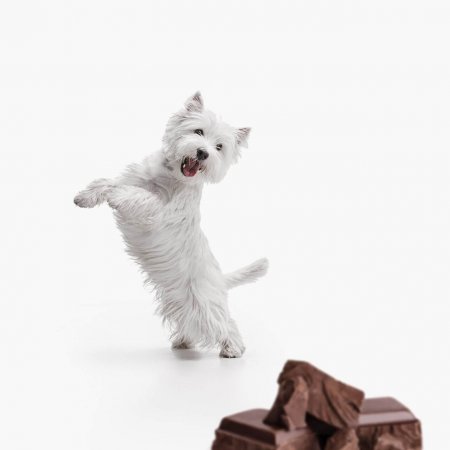
Dogs are known for loving food, so it is our duty as pet owners to prevent them from swallowing anything that could be harmful. Chocolate is one of the most frequent hazards for dogs. While being a favorite treat for humans, chocolate can be poisonous and even fatal to our animal friends. This article will discuss other human foods that are harmful to dogs, why chocolate is harmful to dogs, how theobromine affects dogs, the symptoms of chocolate poisoning, what to do if your dog eats chocolate, how to prevent chocolate poisoning, and what to do if your dog consumes chocolate.
Theobromine, a substance found in chocolate, is poisonous to dogs. All forms of chocolate, including dark chocolate, milk chocolate, and even white chocolate, contain theobromine, a stimulant akin to caffeine. Theobromine content varies from chocolate to chocolate, though. White chocolate, milk chocolate, and dark chocolate all contain significant amounts of theobromine.
Dogs metabolize theobromine far more slowly than humans do, which results in differing effects on canines. Because of this, theobromine can build up in the body to dangerous levels and stay there for a long time. Dogs’ respiratory, circulatory, and central nervous systems are all impacted by theobromine. Depending on how much chocolate was consumed and the size of the dog, theobromine overdose symptoms might range from moderate to severe.
Dogs’ symptoms of chocolate poisoning
Symptoms can start to show up within a few hours, and they can include vomiting, diarrhea, a fast heart rate, restlessness, hyperactivity, muscle tremors, seizures, and even death. The amount of chocolate consumed and the size of the dog both affect how severe the symptoms are. Smaller canines are more vulnerable to theobromine’s harmful effects because it takes less of it to hurt them.
If you have reason to believe that your dog has consumed chocolate, you must take action right away. As soon as possible, get in touch with your veterinarian or the ASPCA Animal Poison Prevention Center. They’ll ask about the kind of chocolate you ate, how much you ate, and your dog’s weight. They will advise you on what to do next based on this information. Your dog might need to receive treatment in a hospital in more serious situations.
It’s easy to avoid chocolate poisoning. Keep all chocolate and goods containing chocolate out of your dog’s reach for the best protection. This comprises a cocoa powder, cookies, cakes, chocolate bars, and chocolate chips. Make sure any kids in the family are aware that chocolate is not a treat for dogs. Also, it’s crucial to watch out for your dog when you have visitors over because they can unintentionally leave chocolate lying about.
Chocolate is not the only human food that can be harmful to dogs, though. Additional items to stay away from giving your dog are alcohol, caffeine, avocados, macadamia nuts, grapes, raisins, onions, and garlic (a sugar substitute found in sugar-free gum and other products). To minimize any hazards, it is usually better to limit yourself to dog-specific treats and foods.
